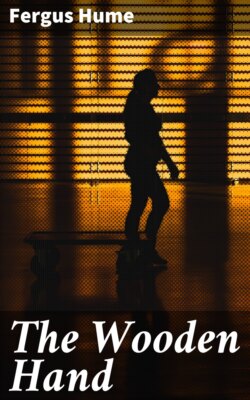Читать книгу The Wooden Hand - Fergus Hume - Страница 7
На сайте Литреса книга снята с продажи.
CHAPTER IV MYSTERY
ОглавлениеMr. Hill's house at the far end of the village was an eccentric building. Originally it had been a labourer's cottage, and stood by itself, a stone-throw away from the crooked highway which bisected Wargrove. On arriving in the neighbourhood some twenty-five years before, Mr. Hill had bought the cottage and five acres of land around. These he enclosed with a high wall of red brick, and then set to work to turn the cottage into a mansion. As he was his own architect, the result was a strange mingling of styles.
The original cottage remained much as it was, with a thatched roof and whitewashed walls. But to the left, rose a round tower built quite in the mediæval style, to the right stretched a two-story mansion with oriel windows, a terrace and Tudor battlements. At the back of this, the building suddenly changed to a bungalow with a tropical verandah, and the round tower stood at the end of a range of buildings built in the Roman fashion with sham marble pillars, and mosaic encrusted walls. Within, the house was equally eccentric. There was a Spanish patio, turned, for the sake of the climate, into a winter garden and roofed with glass. The dining-room was Jacobean, the drawing-room was furnished in the Louis Quatorze style, Mr. Hill's library was quite an old English room with casements and a low roof. There were many bedrooms built in the severe graceful Greek fashion, a large marble swimming-bath after the ancient Roman type, and Mr. Hill possessed a Japanese room, all bamboo furniture and quaintly pictured walls, for his more frivolous moods. Finally there was the music-room with a great organ, and this room was made in the similitude of a church. On these freaks and fancies Mr. Hill spent a good deal of money, and the result was an olla-podrida of buildings, jumbled together without rhyme or reason. Such a mansion--if it could be called so--might exist in a nightmare, but only Mr. Hill could have translated it into fact. Within and without, the place was an example of many moods. It illustrated perfectly the mind of its architect and owner.
Allen's father was a small, delicate, dainty little man with a large head and a large voice, which boomed like a gong when he was angry. The man's head was clever and he had a fine forehead, but there was a streak of madness in him, which led him to indulge himself in whatever mood came uppermost. He did not exercise the least self-control, and expected all around him to give way to his whims, which were many and not always agreeable. Some one called Mr. Hill a brownie, and he was not unlike the pictures of that queer race of elves. His body was shapely enough, but as his legs were thin and slightly twisted, these, with his large head, gave him a strange appearance. His face was clean-shaven, pink and white, with no wrinkles. He had a beautifully formed mouth and a set of splendid teeth. His fair hair, slightly--very slightly--streaked with grey, he wore long, and had a trick of passing his hand through it when he thought he had said anything clever. His hands were delicate--real artistic hands--but his feet were large and ill-formed. He strove always to hide these by wearing wide trousers. Both in winter and summer he wore a brown velvet coat and white serge trousers, no waistcoat, and a frilled shirt with a waist-band of some gaudy Eastern stuff sparkling with gold thread and rainbow hues. When he went out, he wore a straw hat with a gigantic brim, and as he was considerably under the ordinary height, he looked strange in this headgear. But however queer his garb may have been in the daytime, at night Mr. Hill was always accurately attired in evening dress of the latest cut, and appeared a quiet, if somewhat odd, English gentleman.
